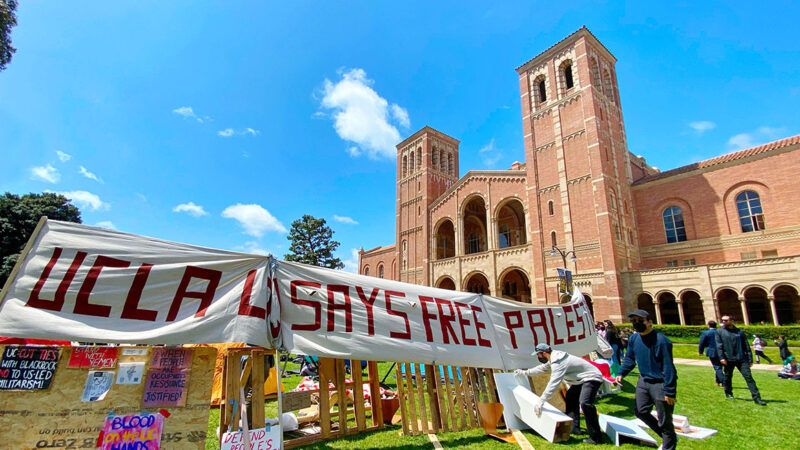What Free Speech Rights Do Anti-Israel Activists Have on College Campuses?
Public colleges must have viewpoint-neutral policies, but they don't have to allow protester encampments.

Since Hamas' attack on Israel last October and the war in Gaza that followed, college campuses across the nation have been embroiled in a series of pro-Palestinian, anti-Israel protests. In the spring, more than 100 of these protests turned into encampments. At several colleges, tent encampments devolved into spurts of violence and vandalism, and occasional clashes with police brought in to break them up.
As the school year drew to a close, scenes of chaos at colleges such as Columbia and UCLA commanded national headlines. The situation became even more gripping when university administrators called in law enforcement to break up the encampments, and several schools canceled their main graduation ceremonies.
In the aftermath of these protests, many sympathetic commentators insisted that the response by university presidents to pro-Palestinian encampments was straightforward censorship.
Crackdowns on the encampments illustrate "the gulf between the ideals of the First Amendment and the actual practice of free speech in the United States," Megan Iorio, senior counsel at the Electronic Privacy Information Center, wrote in Tech Policy Press in May. "The freedom of individuals to assemble, associate, and express their opposition to the viewpoints of those in power is fundamental to the concept of free speech, yet the discourse has treated these rights as subservient to the rights of university administrators to enforce rules about the use of campus space."
The situation is less straightforward than how Iorio frames it. While university administrators have violated the rights of students peacefully protesting—for example, at several Texas public colleges—both private and public universities are generally well within their rights to ban tent encampments.
"While campus encampments are expressive conduct—no one doubts protesters are sending messages here—that's not the end of the story," writes Jessie Appleby of the Foundation for Individual Rights and Expression. "Even in spaces where protest rights are at their maximum—public sidewalks, public parks, and open outdoor areas of public campuses—the government, including public universities, can still enforce reasonable time, place, and manner restrictions on when, where, and how people protest."
While public universities are beholden to the First Amendment—and private universities that promise wide-ranging speech freedoms are open to claims of contract violation if they punish students for their speech—colleges are almost never required to allow a tent encampment to continue.
"Overnight encampments could create public safety risks and overtax campus security. They may prevent other groups on campus from using the space for a prolonged period," Appleby explains. "They could obstruct access to campus facilities or disrupt classes and other daily activities. All of these are legitimate reasons for universities to restrict encampments."
It is vitally important, however, that such a policy be enforced neutrally. If a college allowed a tent encampment in protest of one issue to proceed but cracked down on a pro-Palestinian one, that could constitute illegitimate viewpoint discrimination.
And just because universities have a legal right to ban tent encampments doesn't mean it's always a good idea to bring in the police. While some encampments, such as those at Columbia and UCLA, became disruptive (at UCLA, thanks mostly to counterprotesters), many universities facing pro-Palestinian encampments were in a genuine bind.
If the tent encampments continued, administrators risked encouraging future disgruntled students to effectively take over patches of campus in protest—and also risked having university presidents hauled before Congress. If they responded too harshly to peaceful civil disobedience, administrators risked looking cruel and pushing angry students to try even more disruptive forms of protest, such as occupying a building.
What lesson should universities take from a school year of raucous civil disobedience? For starters, a formal policy of institutional neutrality, while far from perfect, could set a firm precedent that universities won't take sides on contemporary political debates—and therefore won't bow to pressure from students to do so.
There's been some indication that universities are looking to move in this direction. For example, in May, Harvard announced it would take a formal stance of institutional neutrality. A Harvard Crimson survey found that more than 70 percent of faculty in the university's School of Arts and Sciences supported that policy.
Many universities have released statements about hotly debated current events in recent years. This latest controversy may have given them the push they needed to stop unnecessarily taking sides.
This article originally appeared in print under the headline "Colleges Should Be Content Neutral on Campus Protest."


Show Comments (39)